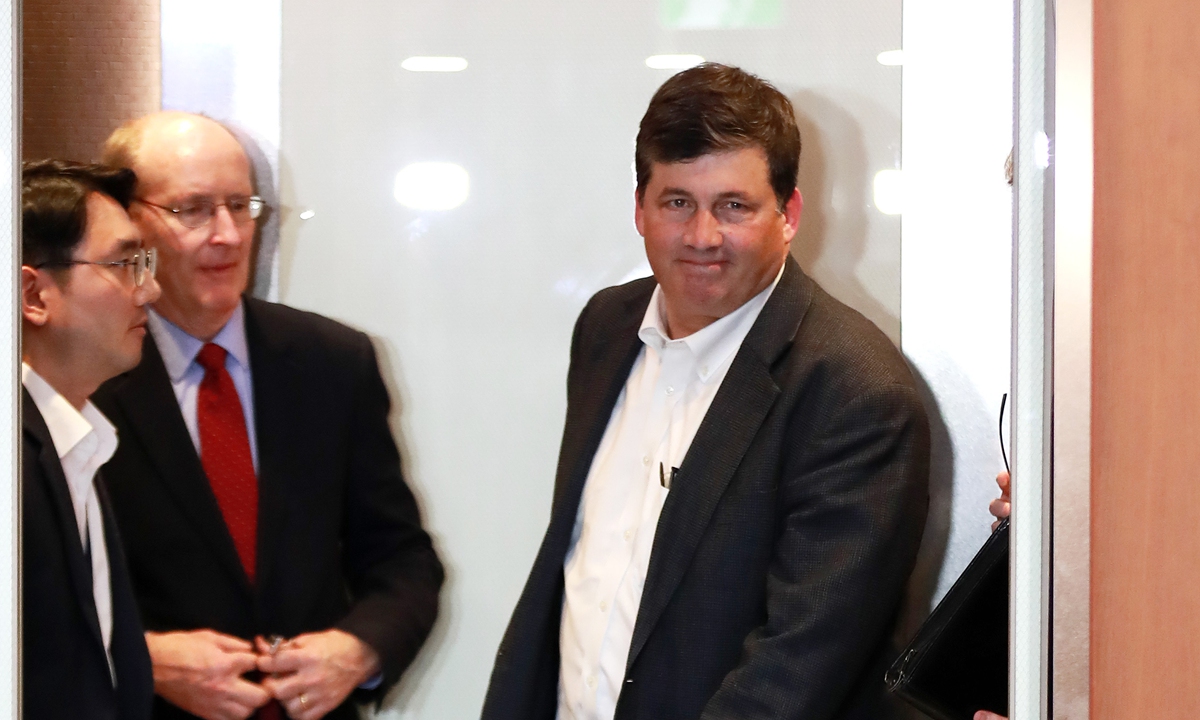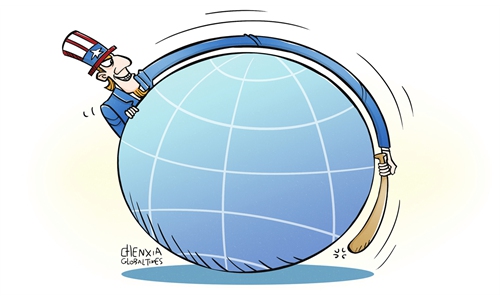Candidate for US state department top China policy official has strong ‘intelligence background,’ to serve political offensive goals

Mark Lambert(center) Photo: VCG
Mark Lambert, a veteran diplomat with rich experience in East Asian affairs, is reportedly the most likely candidate to become the top China policy official with the US State Department. Chinese analysts warned on Wednesday that the appointment could indicate the Biden administration's increasing efforts to rebuild its intelligence network to serve Washington's political offensive goal against Beijing, given Lambert's extensive resume of being a political military officer, among other positions, in numerous Asian countries.
Lambert will likely be named as the deputy assistant secretary for China and Taiwan region, the sources said, filling the post left in June by Rick Waters, Reuters said in an exclusive report on Tuesday, citing five sources familiar with the matter.
Lambert, an Asia expert who did two rotations at the US embassy in Beijing, most recently served as a Deputy Assistant Secretary in the Office of East Asia and Pacific Affairs overseeing the office for Japanese Affairs, for Korean and Mongolian Affairs, and the office that manages relations with Australia, New Zealand, and the Pacific Islands, according to the Website of the US State Department.
According to the US State Department website, Lambert was named the State Department's human rights officer of the year for "devising a strategy to release Chinese political prisoners and promote religious freedom."
Lambert was also involved in resolving the 2001 China-US fighter crash, when a US spy aircraft illegally entered Chinese air space in the South China Sea before it collided with People's Liberation Army Navy's fighter jet ordered to track and monitor it.
When his experience of handling the China-related affairs which is heavily tilted to the domains of military security and human rights affairs, it is estimated that Lambert, after assuming the position, would likely focus on issues where the two sides are at odds and strengthening the "intense competition" between the US and China, Li Haidong, a professor at China Foreign Affairs University, told the Global Times on Wednesday.
Lambert could be more of an intelligence officer than a regular diplomat, and his appointment could be part of - or at least has strong connection to - the US' rebuilding of its intelligence networks that US Central Intelligence Agency (CIA) director William Burns disclosed in July, Lü Xiang, a research fellow at the Chinese Academy of Social Sciences, told the Global Times on Wednesday.
Burns, while attending the Aspen Security Forum on July 20, said that progress had been made in rebuilding US spy networks in China and they are working hard to build a very strong human intelligence capability to complement what they can acquire through other methods.
Commenting on the CIA director's remarks, Chinese Foreign Ministry spokesperson Mao Ning said on July 24 during a routine press conference that the US on the one hand keeps spreading disinformation on the so-called Chinese spying and cyber attacks, and on the other hand tells the public about its large-scale intelligence activities targeting China. This in itself is quite revealing.
China will take all measures necessary to safeguard national security, the spokesperson warned.
China unveiled two CIA espionage cases against China within half a month in August.
Lambert, according to the US state department website, served as Political Military officer in Bangkok and Tokyo and as a science and technology officer on the State Department's Japan Desk.
Bangkok and Tokyo happen to be US intelligence hubs in Asia, according to Chinese experts of American studies.
His previous posts as a military political officer in Asian countries could strongly suggest an intelligence background, and if he is appointed as the US' top China policy official, it could indicate that the US State Department and the CIA are ramping up intelligence capabilities targeting China and relevant political offensives against China. The means that spreading anti-China information and creating social antagonism with disinformation would be correspondingly intensified, Lü warned.

